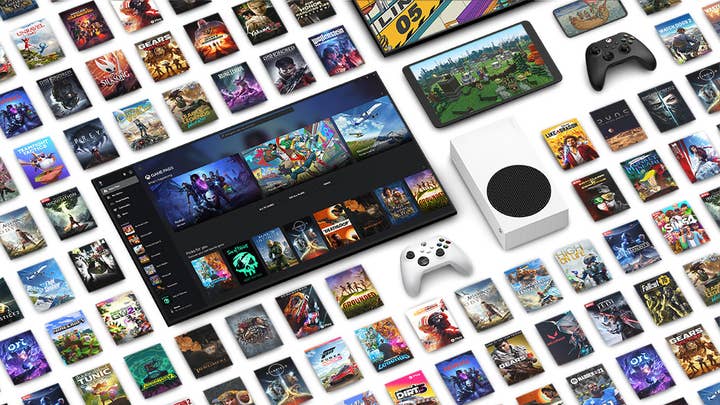Price hike shows Xbox is determined to make Game Pass work | Opinion
The price rises reflects the need for profitability and the strength of Xbox's first-party line-up
If there were any doubts about Xbox's commitment to Game Pass (and there was plenty of industry chatter earlier this year that suggests there were), the firm has well and truly silenced them over the past two months.
First came the news that Call of Duty: Black Ops 6 would be included in Game Pass on the same day it launches everywhere else. Then there was the barnstorming Xbox Summer Showcase, where every first-party game was followed by the words: 'Play It Day One On Game Pass'. This included games for 2024, 2025 and even beyond that.
Xbox is clearly determined to make Game Pass work. But there is a challenge. Game Pass numbers haven't grown much over the last 18 months, if at all. Meanwhile, premium sales of Xbox games have been disappointing. Hellblade 2 in May didn't even make the Top 100 in Europe.
Xbox, just like the rest of the industry, has a growth problem. And it's at times like these when games businesses — particularly public Western businesses — become hyperfocused on profitability and margin. That's partly why we've had the layoffs that have blighted the industry since last year. And when you consider that focus on the bottom line, is it financially prudent to put Call of Duty: Black Ops 6, which millions are comfortable spending $70 on, into a service for $11 a month? Xbox would attract new users into Game Pass, certainly, but it'll come at the expense of revenue.
Xbox could have moved away from putting games like that into Game Pass on day one, but instead of going back on its vision, it has opted to raise prices and tweak its offering.
Is it financially prudent to put Call of Duty: Black Ops 6, which millions would spend $70 on, into a service for $11 a month? Xbox would attract new users but at the expense of revenue
There has been some simplification, a removal of a tier, an introduction of a new one, and restrictions on 'stacking' memberships in certain countries. I won't go into all the details, but the bottom line is that Game Pass is becoming more expensive, with users being encouraged to get the $20-a-month Game Pass Ultimate option.
Ultimate represents Xbox's full vision for the future: cross-play, cross-save, multiplatform, streaming and full buffet of new and classic games. And it's by far the most popular of the tiers, with data firm Ampere estimating that 74% of Game Pass console users subscribe to Ultimate.
Increasing prices in this economy is always going to be a tough sell, but Xbox will feel it's being reasonable. And it will hope that with Call of Duty in the line-up, plus the games it revealed in June, players will still see the value in the full offering.
The introduction of a 'Standard' tier that doesn't include brand new Xbox releases, but does feature a library of older games, is an interesting one. At $15 (which includes online multiplayer access), Xbox has created a tier that should be more compelling for price-conscious players that would like online play and a selection of games but isn't fussed whether those games are brand new or not. It's an offering comparable to what Sony has been delivering with PlayStation Plus.
One potential point of contention is that PC players can subscribe to Game Pass, and get the full library of games, for a significantly lower fee than console players ($12 vs $20), which will no doubt frustrate some Xbox purists. This reflects the fact that there isn't much user growth to be had on console (the Game Pass attach rate on Xbox consoles is understood to be very high), whereas there is still decent potential to attract new Game Pass customers on PC. So, you can understand Microsoft's reluctance to increase PC pricing too much.
There will likely be more tweaks and additions over time. As streaming accelerates, Xbox will no doubt consider a subscription option for those without a gaming PC or an Xbox console. And the upcoming push into mobile (spearheaded by the likes of Candy Crush and Call of Duty Mobile) may also see a further change, whether that's a standalone mobile Game Pass, and/or adding mobile into these existing tiers.

Increasing the prices is just one way for Xbox to deliver growth. The other is around the firm’s plans to release more and more Xbox games on other platforms, including those owned and operated by PlayStation and Nintendo.
Again, some Xbox loyalists are not happy about this. And perhaps that's why the firm has been so slow in announcing which games are launching on competitor platforms. It started with four mostly niche games earlier this year (alongside existing titles like Minecraft and Call of Duty), and then there was news last month that the next Doom game would be coming to PS5.
Ultimate shows Xbox's full vision for the future: streaming, cross-play, cross-save, multiplatform, and full buffet of new and classic games
I do wonder if ripping the plaster off would have been a better move. Its vocal minority of fans may be unhappy (during the screening of last month's Xbox showcase in LA, one invited fan yelled 'PlayStation sucks' during one of the early trailers), but this should be a good news story for Microsoft, and one that makes sense for the accountants as much as the gamers.
If Xbox opened its show in June by declaring this event is for players on all platforms, welcoming those from across the gaming ecosystem, you'd be hard pressed to paint that as a negative. Last month's victory for Xbox could have been (and might still have been) a victory for everyone.
Putting more of its first-party games on PlayStation and/or Nintendo also has potential upside for Game Pass. Not only would it highlight the quality of its slate to an audience it otherwise wouldn't reach, but it also widens the commercial potential of the titles themselves, which in turn should lead to bigger marketing spend.
Xbox Game Pass marketing has been largely focused on its own channels and specialist gaming outlets, and there wasn't a huge amount of mainstream promotion done for games like Halo and Starfield. Making these games available in more places will make bigger marketing campaigns more justifiable. And wider promotion around major releases, alongside already announced partnerships with Samsung and Amazon, should help Game Pass reach a wider player base.
What's more, there are numerous case studies of third-party games that do well on Game Pass and then see a sales boost on other platforms. And why shouldn't Microsoft get in on that, too?
All of these moves are around making Game Pass more sustainable and profitable, whilst mitigating increasing costs and the potential lost revenue that will come by putting Call of Duty into the service. And it should work. Ampere estimates that global Game Pass average revenue per user will increase by 5.4% this year and jump 15.3% in 2025. Overall, it estimates Game Pass spending will hit $5.5 billion by the end of next year.
There is scepticism within the industry that Game Pass makes long-term business sense. And there are even those that feel subscription is potentially harmful to revenues overall. At the same time, there's a growing argument – and one I've been coming round to – that in a world where gamers are playing fewer, bigger, online games like Fortnite and Roblox, a service that encourages people to experience a variety of different titles might just be a good thing.
If Xbox can deliver stronger revenue, and continue to prove that there's a symbiotic relationship between the subscription and premium business models, then perhaps more people in the industry will believe in its potential.
What's clear from the past six weeks of updates and game announcements, is that Xbox's determination to get Game Pass working remains resolute.

